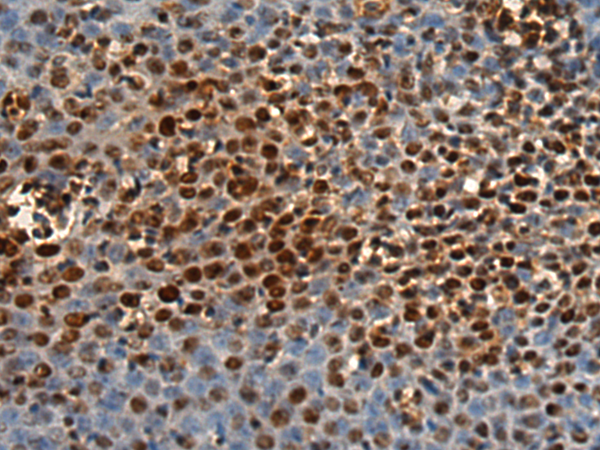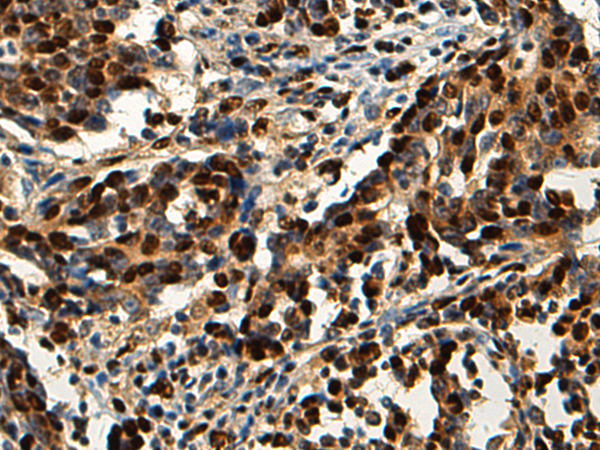

| WB | 咨询技术 | Human,Mouse,Rat |
| IF | 咨询技术 | Human,Mouse,Rat |
| IHC | 1/200-1/400 | Human,Mouse,Rat |
| ICC | 技术咨询 | Human,Mouse,Rat |
| FCM | 咨询技术 | Human,Mouse,Rat |
| Elisa | 1/5000-1/10000 | Human,Mouse,Rat |
| Aliases | Ki; PA28G; HEL-S-283; PA28gamma; REG-GAMMA; PA28-gamma |
| Host/Isotype | Rabbit IgG |
| Antibody Type | Primary antibody |
| Storage | Store at 4°C short term. Aliquot and store at -20°C long term. Avoid freeze/thaw cycles. |
| Species Reactivity | Human, Mouse |
| Immunogen | Fusion protein of human PSME3 |
| Formulation | Purified antibody in PBS with 0.05% sodium azide and 50% glycerol. |
+ +
以下是关于PSME3抗体的3篇参考文献及其简要摘要:
---
1. **文献名称**:*PSME3 promotes tumor progression by regulating the ubiquitin-proteasome pathway in colorectal cancer*
**作者**:Li Y, Zhang J, et al.
**摘要**:本研究通过免疫组化(IHC)和Western blot分析发现,PSME3在结直肠癌组织中高表达,并与患者预后不良相关。利用PSME3抗体进一步证实其通过调控泛素-蛋白酶体通路促进肿瘤侵袭和转移的机制。
2. **文献名称**:*Proteasome activator PA28γ regulates p53 activity through interaction with PSME3*
**作者**:Chen X, Sun T, et al.
**摘要**:作者使用PSME3抗体进行免疫共沉淀(Co-IP)实验,发现PSME3(PA28γ)与p53蛋白直接相互作用,影响p53的稳定性及转录活性,揭示了其在癌症中调控细胞周期和凋亡的新机制。
3. **文献名称**:*Development and validation of a monoclonal antibody specific for PSME3 in human breast cancer*
**作者**:Wang H, Liu R, et al.
**摘要**:研究团队开发并验证了一种针对PSME3的单克隆抗体,通过ELISA、免疫荧光和流式细胞术证明其高特异性。该抗体成功应用于乳腺癌组织样本,显示PSME3表达与肿瘤分级呈正相关。
---
以上文献均涉及PSME3抗体的实验应用,涵盖癌症机制研究、蛋白相互作用分析及抗体开发验证。如需更多文献或具体细节,可进一步检索PubMed或Web of Science数据库。
**Background of PSME3 Antibody**
PSME3 (Proteasome Activator Subunit 3), also known as PA28γ or REGγ, is a member of the 11S proteasome regulatory complex family, which plays a critical role in modulating the 20S proteasome's activity. Unlike other PA28 subunits (α and β), PSME3 forms a homoheptameric structure and is predominantly localized in the nucleus. It facilitates the degradation of specific proteins, including cell cycle regulators (e.g., p21) and oncogenic factors, via the ubiquitin-independent proteasome pathway. PSME3 is implicated in diverse cellular processes, such as cell proliferation, apoptosis, and DNA repair, and its dysregulation has been linked to cancers, neurodegenerative disorders, and autoimmune diseases.
Antibodies targeting PSME3 are essential tools for studying its expression, localization, and functional roles. They are widely used in techniques like Western blotting, immunohistochemistry (IHC), and immunofluorescence (IF) to investigate PSME3's involvement in disease mechanisms or its interaction with viral proteins (e.g., hepatitis C virus core protein). Additionally, PSME3 antibodies aid in exploring its potential as a therapeutic target, given its association with tumor progression and chemoresistance. Validated antibodies ensure specificity for distinguishing PSME3 from homologous subunits, supporting both basic research and clinical applications.
×